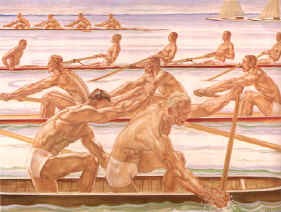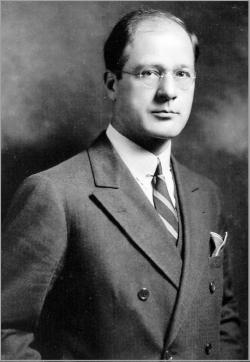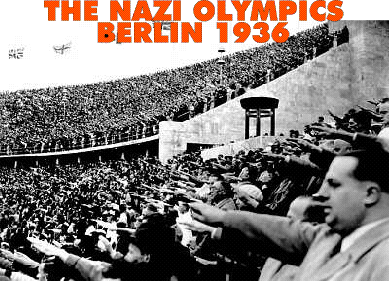|


|
|
Introduction
In August 1936, Adolph Hitler planned to camouflage his anti-Semitic
agenda when Germany hosted the 1936 XI Olympic Games in Berlin. Hitler
planned to amaze foreign spectators with Germany's Aryan
"supreme" master-race. He wanted to strengthen the
German Aryan race and prepare Germany's youth for war. He thought
it was his great chance to convince the world of the superiority of the
Aryan race.
|
| 1931-1933
On
May 13, 1931, the International Olympic Committee (IOC), headed by Count
Henri Baillet Latour of Belgium, awarded the 1936 Olympic Games to
Germany. The choice signaled Germany's return to the world
community after their defeat in World War I. They didn't know that
two years later Nazi Party leader Adolph Hitler would become chancellor
of Germany and rise to power and turn the democracy into a
dictatorship. |

1936
German sports imagery promoted the myth of Aryan racial superiority and
physical power. It portrayed them with chiseled-out muscles and
with blond hair and blue eyes. Hitler initially held the Olympics
in low regard because of their internationalism, but he became an avid
supporter after Joseph Goebbels, his minister of propaganda, convinced
him of their propaganda value. The regime provided full financial
support for the event, 20,000,000 Reich marks ($8,000,000). |
| Exclusion
of Jews
Soon after Hitler took power Jews were banned from sports. The German
Boxing Association expelled amateur champion Eric
Seelig in April 1933
because he was Jewish. Daniel
Prenn, a Jew, Germany's top-ranked tennis player, was removed from
Germany's Davis Cup Team. Gypsies, including the Sinti boxer
Johann "Rukelie" Trollmann, were also purged from German
sports. In June 1933, Trollmann, the German middleweight boxing
champion, was banned from boxing for "racial
reasons". |
| Boycott of '36
Olympics
Soon after Hitler took power in
1933, observers in the
United States questioned the morality of supporting Olympic Games hosted
by the Nazi regime. Respond ing to
the reports of the persecution
of Jewish athletes in 1933, Avery
Brundage president of the American
Olympic Committee, stated: "The very foundation of the modern
Olympic revival will be undermined if individual countries are allowed
to restrict participation by reason of class, creed, or
race." Brundage, like many others in the Olympics movement,
initially considered moving the Games from Germany. After a brief
and tightly managed inspection of German sports facilities in 1934,
Brundage stated publicly that Jewish athletes were being treated fairly
and that the Games should go on, as planned. Debate over
participation in the 1936 Olympics was greatest in the United
States. Brundage opposed this, because he arqued that politics had
no place what so ever in sport, saying, "The Olympic Games belong
to the athletes and not to the politicians." ing to
the reports of the persecution
of Jewish athletes in 1933, Avery
Brundage president of the American
Olympic Committee, stated: "The very foundation of the modern
Olympic revival will be undermined if individual countries are allowed
to restrict participation by reason of class, creed, or
race." Brundage, like many others in the Olympics movement,
initially considered moving the Games from Germany. After a brief
and tightly managed inspection of German sports facilities in 1934,
Brundage stated publicly that Jewish athletes were being treated fairly
and that the Games should go on, as planned. Debate over
participation in the 1936 Olympics was greatest in the United
States. Brundage opposed this, because he arqued that politics had
no place what so ever in sport, saying, "The Olympic Games belong
to the athletes and not to the politicians."
|
|
The Games
The Olympics
were a perfect arena for the Nazi propaganda machine, which was
unsurpassed in staging an elaborate public spectacles and rallies.
Behind the facade, however, a ruthless dictatorship persecuted it's
enemies and rearmed for war to acquire a new "living space"
for the "Aryan Master Race." Germany skillfully promoted
the Olympics with colorful posters and magazine spreads. Athletic
imagery drew a link between Nazi Germany and ancient Greece. These
protrayals symbolized the Nazi racial myth that superior German
civiliaztion was the rightful heir of an "Aryan" culture of
classical antiquity. The Nazis reduced their vision of classical
antiquity to ideal "Aryan" racial types: heroic,
blue-eyed, blonds, and with finely-chiseled features.

In August 1936,
Hitler opened the XIth Olympiad, with musical fan fares directed by the
famous composer Richard Strauss, which announced the dictators arrival
to the dominant German crowd. Inaugurating a new Olympic ritual, a
lone runner entered the stadium carrying a torch which was relayed from
the site of the ancient Games in Olympia, Greece.
The United
States was able to dominate the track and field events largely in part
by the help of Jesse Owens, 14 of the 56 medals won by the U.S. were won
by African Americans. This was seen by many as a blow to the Nazi
myth of Aryan supremacy. It was well known that after Jesse had
won or any of the other black athletes, at the first day of the
competition officers of Olympic protocol as Hitler to either shake the
hands of all the winners or none, he chose none.
|
|
|